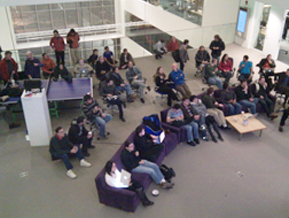Impressive, my dear Watson
-
-
slice.mit.edu
- 2
Filed Under
Recommended
Professor Patrick Henry Winston ’65, SM ’67, PhD ’70
No doubt about it, Watson's defeat of its human opponents was impressive. To know just how impressive, we will all have to wait for the IBM developers to publish the details.
But even without the papers, Watson has three undeniable achievements: rekindling interest in Artificial Intelligence; promoting IBM as a place where cool things get done; and advancing the state of the art in natural language processing, information retrieval, and machine learning.
Pockets of students watched together all over campus, cheering for Watson. There was a buzz about it all week.
Simplicio: It certainly was an engineering marvel, like the first landing of a man on the moon.
Sagredo: Well, maybe not like the first man on the moon, but certainly like launching the first satellite.
Simplicio: This marks the beginning of the end of human primacy.
Sagredo: It would be more Churchillian, and correct, to say it is not the beginning of the end, but perhaps the end of the beginning.
Simplicio: Is there anything we can do that Watson can't?
Salviati: You mean now or faster, I suppose. After all, Turing showed how any computer can simulate another, so Watson can simulate us, in principle.
Simplicio: I'm not a computer.
Sagredo: Watson shows what 30 very smart human engineers can do in four years, given that they are backed by visionary management, and build on ideas generated, for example, at MIT. But Watson, as is, couldn't build another Watson, ever.
Salviati: Think of the medical applications. Say, A disease marked by fever, tachypnoea, tachycardia, hypoxemia, and diaphoresis, and Watson will come back instantly with, What is bacteremia. The better medical schools must be revising their curricula.
Simplicio: What is bacteremia?
Sagredo: Better not include Tom Sawyer in the database; say, A risk factor for warts, and Dr. Watson might suggest, What is a frog.
Simplico: Ah, reasoning.
Salviati: Yes, and not just logic. You have to be able to think about precedents and how they read on new situations.
Sagredo: Perception and imagination are important, too. Our human language system somehow enables us to answer questions using our perceptual apparatus on imagined events we have never experienced, never seen, and never read about.
Simplicio: I can't think of an example.
Sagredo: Imagine running down the street with a full bucket of water.
Simplico: My leg would get wet.
Segredo: What if the bucket were full of nickles?
Simplicio: I would be bent over.
Salviati: Anyway, it was quite a milestone, just like Deep Blue before. IBM certainly knows how to do these things well. But, I wonder, in the fullness of time, what will be the place where the true secrets of human intelligence will be uncovered.
Watson: What is MIT.
Editor's Note: Read Professor Winston's commentary about preparing for a NOVA episode on the Watson phenomenon: "What I Learned from a Pro."









Comments
Dave Rossin 'MS '55
Thu, 02/24/2011 7:44am
Jeopardy is a game. The protocol of answering Jeopardy questions involves punching a thumb button to win the chance to be the one who answers. Watson beat the human contestants time after time because his programming allowed him to punch in before the humans could think of their answer and physically punch their button. The difference could be a half second, but it gave Watson the opportunity to answer while the humans stood and watched.
Bryan Long
Sun, 02/20/2011 1:20pm
As I watched Jeopardy after a day thinking about the challenge of world poverty, I began comparing Watson's capability/Watt and capability/$ to the human brain, and started thinking existing technologies could be used to build a brainsourcing supercomputer that would help alleviate poverty. Essay on Econosystemics.com: http://bit.ly/hfyS8K